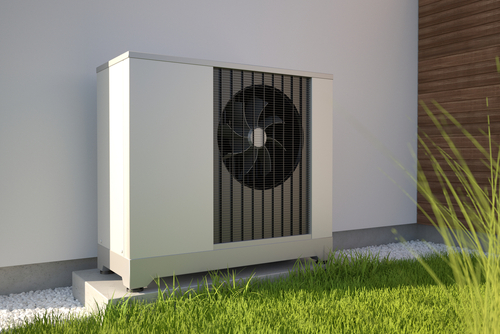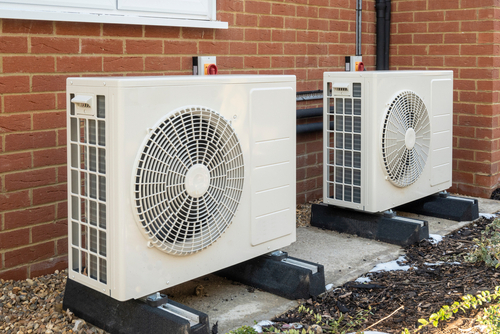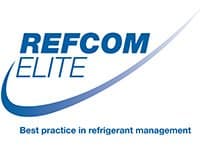As a renewable source of energy, air source heat pumps have been garnering a lot of attention lately, and for good reason. More and more UK homeowners are relying on them to heat their property. But what exactly are they?
What is an Air Source Heat Pump?
Heat is typically generated by burning fuels or by converting electricity. Both air source heat pumps and ground source heat pumps absorb heat from their surroundings and transfer this to a refrigerant liquid, which is compressed to increase the temperature.
Heat pumps transfer heat from the outside environment into the inside of a building. This is done by utilising a refrigerant system, relying on a compressor and condenser to absorb heat in one space and release it in another. The system functions as a heat exchanger.
Heat is captured from the air outside by an air source heat pump and distributed to the body of the home by means of either hot water-filled radiators, underfloor heating, hot air, and hot water (or a combination of these, for example central heating and hot water). Even on colder days there is still heat to extract from the air, with air source heat pumps able to work even in temperatures as low as -15C, although the overall efficiency will be lower in these temperatures.
In addition, they are environmentally friendly, since they do not emit any carbon dioxide or rely on planet damaging fossil fuels.
How is an Air Source Heat Pump different from a Ground Source Heat Pump?
An air source heat pump and a ground source heat pump differ greatly in several key ways. Here are the most important differences:
- The source of heat – Despite the similarities between both pumps, the source of heat differs using either the air or the ground for its source.
- Installation – The installation of a ground source heat pump involves extensive groundworks, which may include digging trenches to bury the pipes as they typically need about 2.5-3 times the land area compared to the floor area of your house. Since air source heat pumps don’t require such extensive groundwork, they are less expensive to install. They will need some space outdoors for the outdoor unit which looks like an air conditioning unit and would need to be sited near an external wall.
- Performance – For ground source heat pumps, the Seasonal Coefficient of Performance rating will be nearer 4 compared to an air source heat pump which typically has a SCOP value of around 3.2. This means that for every 1kW of electricity, 3.2kW of energy is generated.
What Types of Air Source Heat Pumps are there?
When you use an air-to-water heat pump, you do not get quite as high a temperature for your heating as a boiler – air source heat pumps prefer to run at a lower temperature for longer which is a more efficient way to operate. For this to be an effective way to heat your property, you would benefit from either under floor heating or low-flow temperature radiators – although oversized radiators will also work. As air source heat pumps deliver heat at a lower temperature, a home that is better insulated is key to optimising the efficiency of this system.
When considering installing an air source heat pump you should ensure that your installer has design accreditation, as that will give you peace of mind that the system is correctly sized and takes account of the delivery system and size of your pipe work. An accredited installation will also ensure that you are able to claim any grants or incentives from the government towards the outlay (providing other criteria are met).
When constructing new buildings, air-to-water heat pumps are highly popular, and more so now that Building Regulations are changing mid-2022, with the low carbon technology delivered via an air source heat pump, one of the ways of reducing the carbon footprint of a building that planning authorities will be requiring.
A heat pump included in the design of the house at the initial stage will avoid major disruptions of the aesthetics as well as reduce future running costs. In older buildings, installing underfloor heating can be an invasive, expensive, and time-consuming task and is best carried out as part of home renovations or when replacing an expensive heating system such as electric heating or an oil boiler.
The cost of a heat pump installation depends on the level of reconfiguration necessary, as well as the equipment costs. Heat pumps typically cost between £7,000 and £14,000. When you are building a new home or doing major renovations, it can make the installation process much more affordable.
What are the Benefits of an Air-to-Air Heat Pump System?
One of the best things about air-to-air heat pumps (otherwise known as air conditioning type units) is their affordability, as they are significantly more economical than air-to-water or more traditional heating methods.
A space heater that meets your heating needs can usually be installed for about £1,000 – £2,000 in a small home. It is relatively quick and simple to install, and you will not have to do anything different once it is installed.
In addition, air-to-air heat pumps have a higher CoP than air-to-water systems as they can reach up to 5.5 CoP in some models. In addition to single split systems, a broader variety of VRF and VRV systems are also available, providing both heating and cooling, depending on the application.
In addition to working with your heating system, air-conditioning can also be adjusted as needed. By monitoring your energy use, you can determine the most efficient times to use your heating system.
Since air-to-air pumps don’t produce hot water, you will need an additional hot water heater. Indoor units also require space, whether they will be mounted on the walls or ceilings.
It depends on your personal preference as to which type of heating is right for you. Air-to-air heat pumps heat rooms more quickly but always create a certain amount of noise and air movement.

What are the Benefits of an Air-to-Water Heat Pump System?
When you use an air-to-water heat pump, you do not get quite as high a temperature for your heating as a boiler – air source heat pumps prefer to run at a lower temperature for longer which is a more efficient way to operate. For this to be an effective way to heat your property, you would benefit from either under floor heating or low-flow temperature radiators – although oversized radiators will also work. As air source heat pumps deliver heat at a lower temperature, a home that is better insulated is key to optimising the efficiency of this system.
When considering installing an air source heat pump you should ensure that your installer has design accreditation, as that will give you peace of mind that the system is correctly sized and takes account of the delivery system and size of your pipe work. An accredited installation will also ensure that you are able to claim any grants or incentives from the government towards the outlay (providing other criteria are met).
When constructing new buildings, air-to-water heat pumps are highly popular, and more so now that Building Regulations are changing mid-2022, with the low carbon technology delivered via an air source heat pump, one of the ways of reducing the carbon footprint of a building that planning authorities will be requiring.
A heat pump included in the design of the house at the initial stage will avoid major disruptions of the aesthetics as well as reduce future running costs. In older buildings, installing underfloor heating can be an invasive, expensive, and time-consuming task and is best carried out as part of home renovations or when replacing an expensive heating system such as electric heating or an oil boiler.
The cost of a heat pump installation depends on the level of reconfiguration necessary, as well as the equipment costs. Heat pumps typically cost between £7,000 and £14,000. When you are building a new home or doing major renovations, it can make the installation process much more affordable.
The Drawbacks
Some UK homes may not be suitable for ASHPs. The installation of an air conditioning system in a residential flat can be difficult, and that’s assuming the installers can figure out how to get the system to work in a confined space.
For Air to water heat pumps, in addition to retrofitting an existing boiler, you will usually have to replace much of the existing plumbing system and install a new water tank. The amount of space both indoor and outdoor for the units Is also a consideration to take into account.
Read about the disadvantages of Air Source Heat Pumps
What does it cost to install one?
Additional costs may be incurred in addition to the price for the pump alone. These can include the installation of a new hot water tank possible plumbing changes to pipework/radiators or under floor heating and labour charges. You will also want to ensure that your home is well insulated, so that the system is as efficient as possible.
What financial help is there?
There will be grants available from Spring 2022 up to £5,000 as part of the government’s effort to help households install air sourced heat pumps. The total amount allocated is enough to cover 90,000 homes.
Consumers will be able to apply for grants starting in April 2022, and details have yet to be published. The grant scheme is expected to run for three years, and it will likely be oversubscribed, so the quickest applicants to fulfil criteria will be more successful.
Should I invest in an Air Source Heat Pump?
While air source heat pumps have obvious benefits, there are also some aspects to consider so you are clear about how these systems work. Only you can decide if the pros and cons add up to something you want to spend your money on.
TEK, as accredited installers for Air Source Heat Pumps can help you understand what the costs and benefits might be, and options suited to your home whether it is a new build or a retrofit system.
We have extensive expertise in traditional and renewable sources of energy. Whether you have a home or a business, we can help you make an informed decision on the best source of heating for you.
Let TEK assist your heating installation
From our Bristol location, Total Environmental Kooling covers many areas throughout the South West of England and across the country. The ability to manage projects more closely and have easier access to the work site are just some of the advantages that come with working with a local company.
Please do not hesitate to get in touch if you require high quality heat pumps and related services. Give us a call on 01179 523355, or fill in our contact form with any queries you may have. We look forward to working with you.







